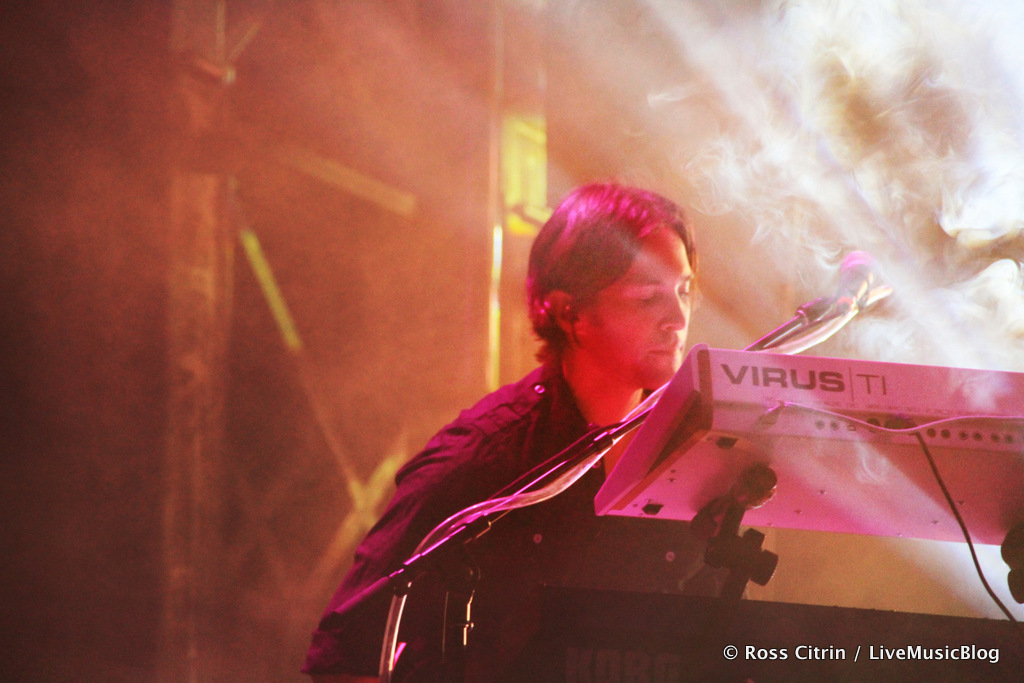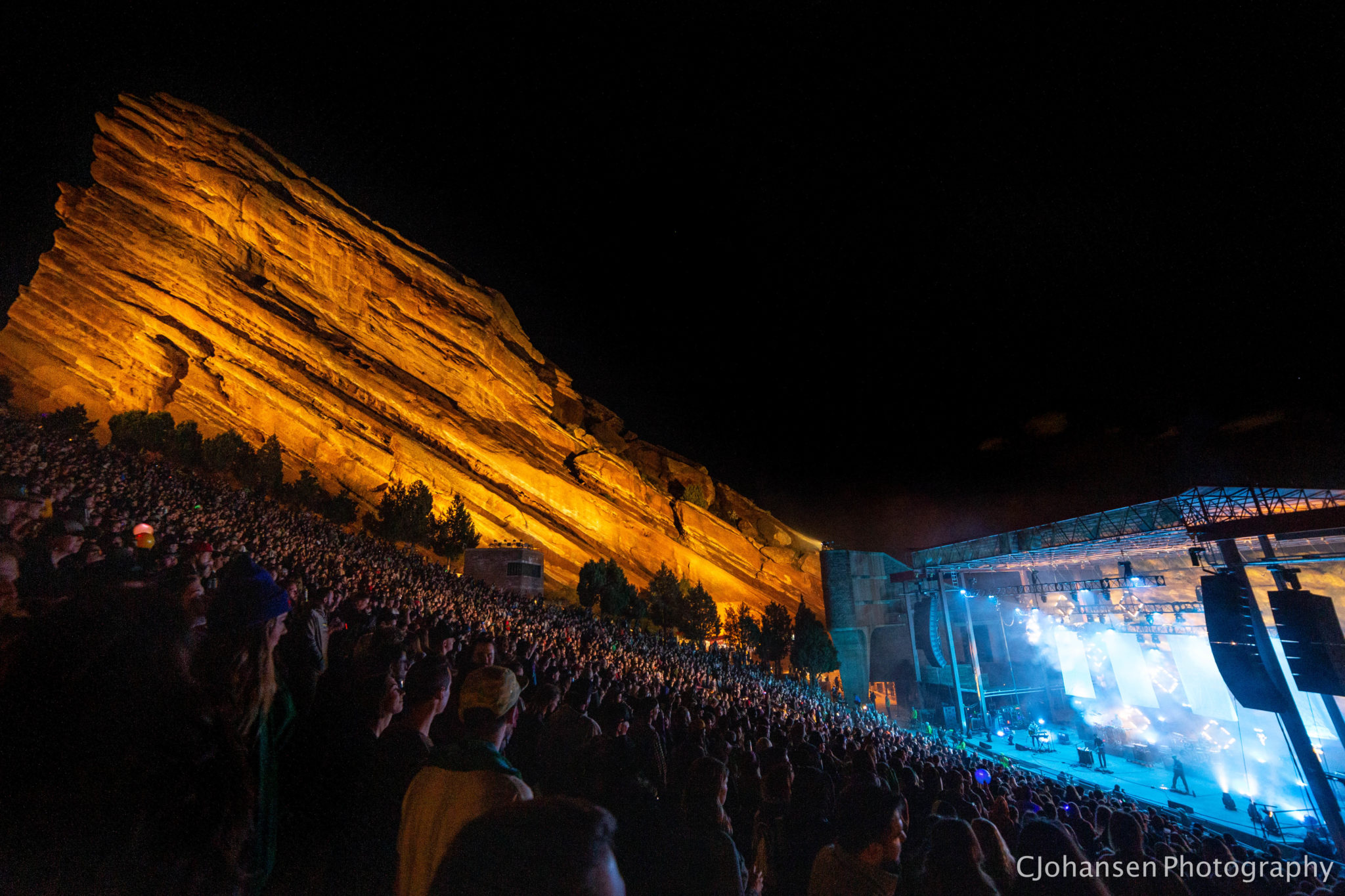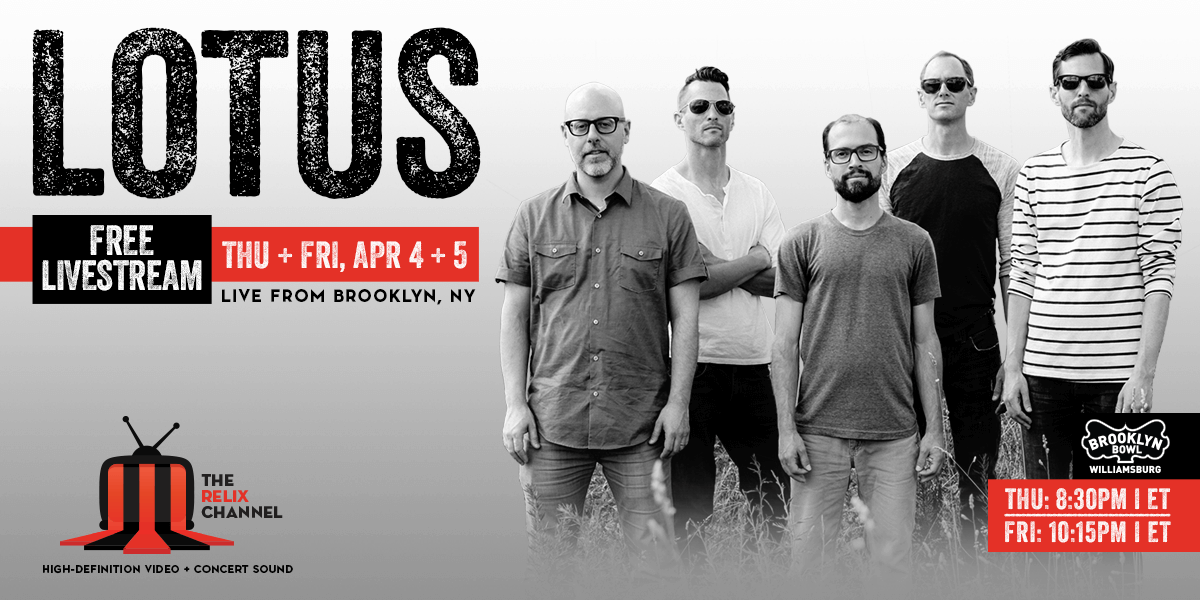Ross Citrin chatted with Lotus’ Luke Miller and got a rather in-depth look into what goes on behind the scenes of the Lotus matrix. Read on below for the extensive interview about Lotus’ origins and current plans moving forward towards the end of 2012 and beyond.
INTERVIEW WITH LUKE MILLER OF LOTUS
RC (LMB): I am hearing that you guys have been spending a lot of time in the studio lately. Can we expect a new album coming soon?
LM: Yea, Were working on I think its going to be three different Projects. The one is done, it’s a hip-hop album it’s a mix of remixes and original songs and then we got a bunch of MC’S to do original verses on top. That one is done. Should be released pretty soon. We just finished mixing that two weeks ago. The other one is more a regular Lotus album and were still going to be recording a few more songs for it in October. I would guess were going to release that maybe in January. Then this other project we are still working on.
RC (LMB): What’s the dynamic of the group? Do certain people click with others better than others? Are you guys still closer then ever?
LM: We don’t really spend that much time together on tour. Kind of everyone has got their own lives but we got a pretty efficient way of working so when we get together we get down to business and everyone knows their parts and we can jump right into rehearsals.
RC: Is there a point in time where you guys think you will be done making music and retire? Or do you plan on doing this for many years to come? And is there anything that you personally wanted to do other then to perform with Lotus, like a side project or something you haven’t really been able to do?
LM: We don’t have any plans to stop. I would love to do this the rest of my life so hopefully we can. Luckily with Lotus it’s a pretty open framework, which you know, we got lots of different things inside of that. So I haven’t had too much stuff where I’m like “Oh I really want to do this thing” it doesn’t fit it in to Lotus because usually it fits in someway. I guess one thing I was working on was I had a bunch of songs that had more of a vocal emphasis, which is a little bit harder to fit into the Lotus matrix. But I don’t know we could go ahead and do that as a Lotus thing even if its something we didn’t perform a lot live. But I might be starting this side project soon in Denver in the fall that is a kind of like a live disco thing.
RC: Sort of like what your brother is doing with Beard O’ Bees? Something opposite?
LM: It would be a little bit different. There is more of a live element to it.
RC: What is the most important aspect of your music? Is there a message that you are trying to convey? Groups like Papadosio and Shpongle have a direct message that they are spreading and that is others above self taking care of one another, love one another, find spirituality and follow it wherever it may take you. Does Lotus feel like there is a overall message similar to this? Or do you guys have another message other then we’re having a good time let’s all dance.
LM: You know I think there is, although it’s nothing explicit. I think it just comes out at the vibe of the shows and like the audience, the energy of the shows which I feel like is different then some of these other concerts I have seen like you said “we’re just here to have a good time” But its nothing that we like, there’s not like some secret message that hidden somewhere that we’re like okay lets like sneak this in. I think it’s more of just how we want to live and then we just bring that to stage. I guess what I am trying to say is that it’s not something we’re preaching it’s just something that we do that comes across in the show.
RC: As sort of the leader of the band, what are some of your daily duties that you do to keep everyone in-line and what not?
LM: Well…. I think writing the set list is like a major thing, shaping the show. I do that. And then when we are improvising, there’s certain times when we let it ride and see what happens but then sometimes if it’s floundering or if its not going somewhere will like, me or Jesse will talk to the rest of the group and be like “Okay lets change it up here, lets go into a breakdown of just the base and the drums”. Then we will rebuild from there so we can get on to something that’s moving in a more interesting direction or something. As far as keeping people in line, everyone pretty much polices themselves at this point. The tour manager does more of that stuff.
RC: How do you feel the group has changed over the years? What’s your take on the fad of heavy EDM music and where do songs like “Dowrn” and “Massif” come from when you started with a song like “Umbilical Moonrise”?
LM: The first part, we started when we were in college and the main thing was at least for me personally was; I was kind of just learning how to play the instruments. Maybe some of the other guys were a bit better at their instruments already. But for me it was learning music and how it works. I definitely was not a songwriter back then. I would kind of get an idea for a groove and have a riff and there would just be a lot of improv. And then at the shows we were at these bars and maybe a couple people would come to see us but then a lot of people were just hanging at the bar. So part of the show was trying to draw people in, so that atmosphere influenced the music because it wasn’t like the lights go dim and people start cheering before we come on stage like it is now. We would get up and play and try to coax people away from the bar to come watch us. So when that situation started to change the music started to change along with it.
We needed to come out and not ease into the music; we needed to be like “bam” right into it. People were expecting something exciting either way. Then it took a long time, (I don’t know why I was such a slow learner) to learn how to right a song. I think it was partly just learning the technology and having the tools available to put together an entire song by myself. Then when it finally all clicked I could start writing songs.
With the EDM thing what do I think of it? I think there is a power to it that is seductive to people and it’s easy to see why kids who get especially excited about it because there’s this energy in it. It’s exciting; there are definitely some downfalls of that seductive power. Because a lot of times it seems like people just do the same thing – like “oh this big build up works so I’ll just throw that in this song.” There is a lack of substance to a lot of it. Like you were saying its kind of about “it’s Friday night let’s party kind of vibe” which is fine, I have no problem with that but it can be a bit insubstantial.
With those two songs you mentioned, Jesse wrote the one “Dowrn” he was experimenting with having different bass timbres. He was messing around with electric bass and also at that time we were working on stuff that was more of hip-hop tempo range. So I think he put those things together and that’s how it came out. I wrote massif, with that one I was kind of influenced by, I don’t know I used to listen to a lot of house music so that was kind of my version of an updated, little bit more aggressive house song.
RC: With the fall tour cut short due to Greenfield getting married, are we looking at something similar for spring or is it going to be a big run?
LM: We got a big national tour lined up for winter. Starting in January.
RC: Where do you get samples for songs? Such as Did Fatt, Blue Giant, Travel? Where do these samples emerge from?
LM: Those old samples, Jesse was in getting them. I am not sure where he was getting them. I think they came from old tapes and stuff. Now a days we really try to make our own samples from scratch.
RC: How does it feel to have Chuck back in the mix?
LM: I think the year he was gone it was a good learning experience for us. We figured out more of how we could pull of certain things as far as integrating electronics in with the band’s sound. When he came back we used those techniques and plus having the old percussion to take it a step further.
RC: Would you ever think of scoring a film?
LM: I mean I love new challenges and scoring a film or writing music for a video game would be a really fun challenge. If I had time and the opportunity was right I was definitely try to undertake something like that.
RC: What’s the process of creating a set list for you? When you roll into a venue do you have it already arranged? Do you look at the crowd and then create one? How does that work?
LM: Usually I wait ’til the day of, especially if it’s a venue that we never been to. I sort of vibe out the venue. But if it’s like a bigger show and we know what it’s going to be like I will write it beforehand. I’ve got a whole list of songs broken out into different categories, like what category the song falls into. So I usually go through that and try to get a good mix of the new with the old, stuff from the different albums and stuff with variety of different tempos and tonalities.
RC: Do any of the other members of the band come to you before a show or a special show like Red Rocks and try to create a setlist with you or is it primarily just you?
LM: Not too often, sometimes we will have a couple ideas of what we want to do. But generally they don’t.
RC: What songs touch you the most on an individual level, like throughout the years you have been creating music? Is there anything that will forever stick with you? A certain song that touches you more then others?
LM: I would say its more seeing the people out at the shows really enjoying the music. Seeing them enjoy the music completes it. Sitting at home writing songs is a long process but then when you get on stage and you play the songs, there is people out there that are just loving it! For me that is the final piece of the puzzle, seeing someone enjoy your work.
RC: Is there any particular person or group way back when you were all at Goshen College that influenced the creation of Lotus? Was it something that all of you liked. What influenced this music?
LM: We were all huge Phish fans back in college; I think that was kind of a starting point. Then Mike and our old drummer Steve they were kind of in to funk stuff, like the Red Hot Chili Peppers and things like that. Those things were touchstones at first.
RC: I think you guys actually played some covers of Phish back in the day?
LM: Yea you know when you start out you can’t immediately have 90 minutes worth of your own material. So you got to cover stuff. We covered all sorts of groups we covered Phish, we covered The Grateful Dead and the Red Hot Chili Peppers. We covered James Brown, Medeski, Martin & Wood… What we liked at the time and physically able to play.
RC: With shows that you have gone overseas for like Japan, do you guys plan on exploring more of the world?
LM: Yea we’re trying, it’s not easy. If you go to Europe and say the word “Jam Band” people look at you with a blank stare because no one has ever heard of what that is. More of the model over there is you get your show and you play that show in the exact same order every single night. We’re working on trying to get a distribution deal in Europe so that people will hear us and put us in their own context that is not [necessarily] a ‘jam band’. Lots of indie bands go over there and obviously play electronic music, we could fit into either of those categories but our records aren’t [currently] distributed over there so w hoknows… With Japan we had our records released over there right from the beginning so we already have a fan base over there.
RC: Is there a memorable show that sticks out or do you prefer small intimate shows versus big ones like Red Rocks?
LM: Yea last year we didn’t headline. This year is our first full headlining show at Red Rocks. I mean I love playing the big shows. I think when we first started getting into the really big shows I felt more pressure to go out and make this a good show. In someways that was counterproductive because it’s best to be relaxed on stage. Because we have done it so much, it’s like the sports team saying “just play your game,” so we’re trying to take that energy that we have when it’s a small show, when it is relaxed and not be concerned about f***ing something up, we’re trying to bring that to the big shows.
I look at All Good [where] we played after The Allman Brothers Band and there were a lot of people there. I felt like we came out and played a high energy show but also I felt like it went into some experimental jams that we would do at a smaller club. So I think bringing those together where it’s a tight set list but then there is some big jams that get out there; hopefully we don’t lose to many people. Were trying to bring those two sides together.
RC: Would you ever consider reworking older songs? I know you’re on sort of a different path now but would you ever consider reworking older material, maybe adding some of the new flavor to the older songs? Or are these tunes going to be just no longer in rotation?
LM: We have been bringing back some old songs here and there. We don’t necessarily rework them in a new flavor but we take them and do a little editing. Usually take out some parts that seem to repetitive or just tighten things up a little bit. I think were going to bring back a few more old ones here in the near future. Part of it is just a matter of rehearsing. We don’t have tons of time for rehearsal so typically when we are rehearsing were working on new material. But every now and then will get a little bit of time so we will bring back an older song we haven’t played for a while.
RC: Is it difficult carrying such a busy touring schedule like you guys do?
LM: You know even if your tired before a show, you get up there and the adrenalin starts flowing. We have done this in the past in a lot of situations, we played in upstate New York on one day and then flown to the West Coast the next day. Its always been fine. If members over thinking a show it almost makes it to restrictive and sometimes if your traveling all day an you pop up on stage and you haven’t thought a lot its more of a spontaneous environment.
RC: Thanks so much Luke!








